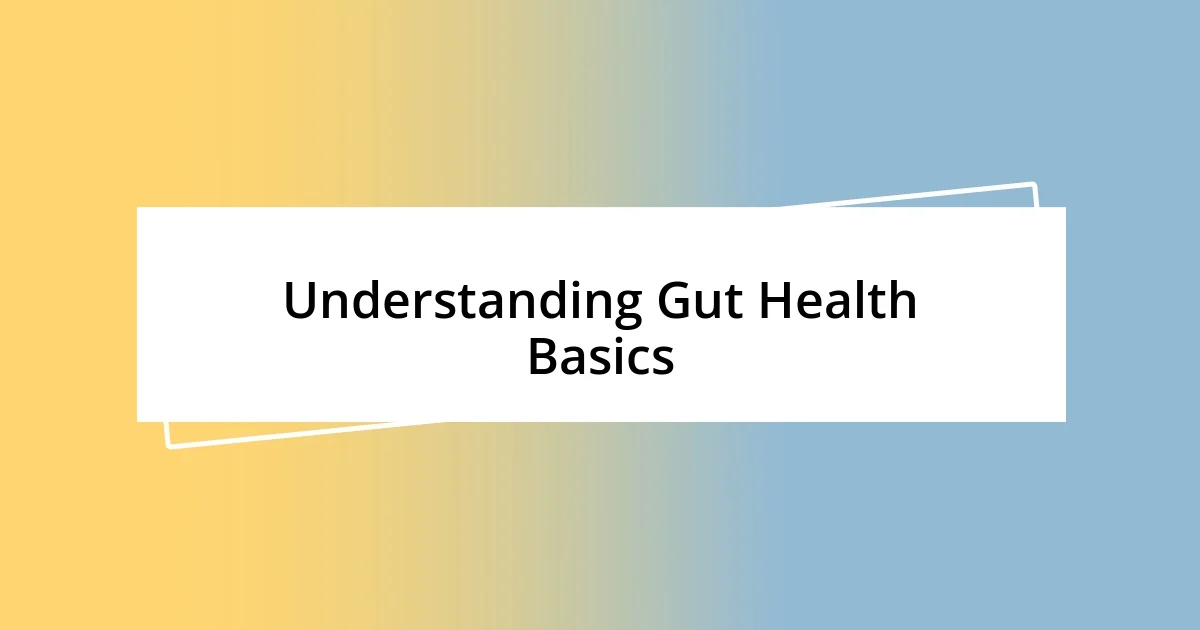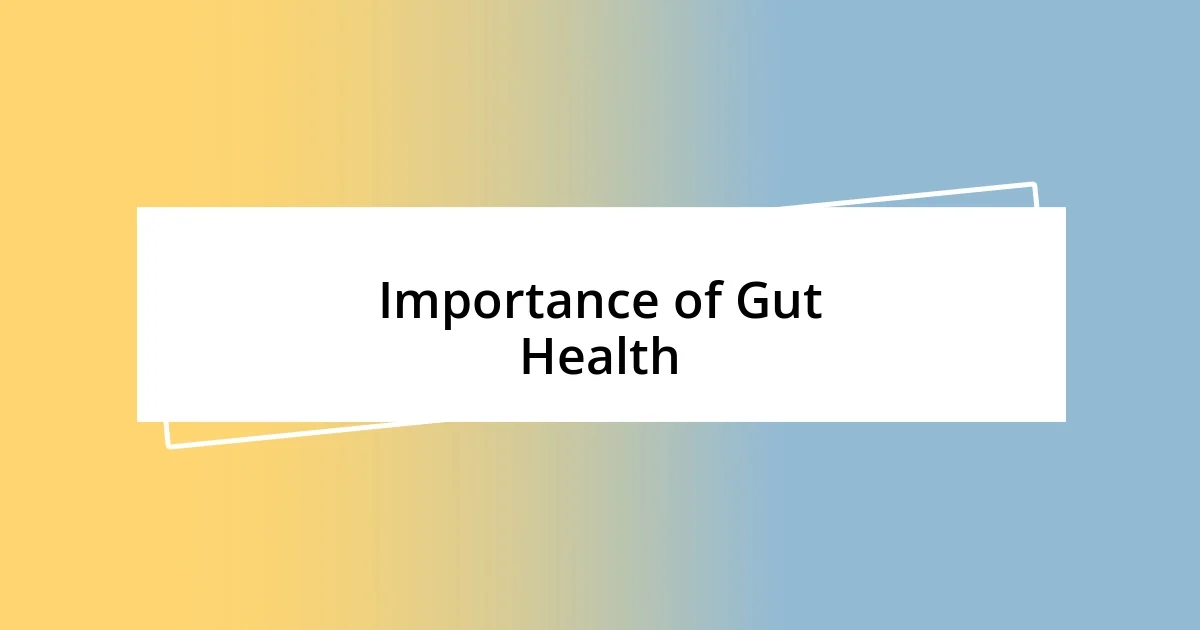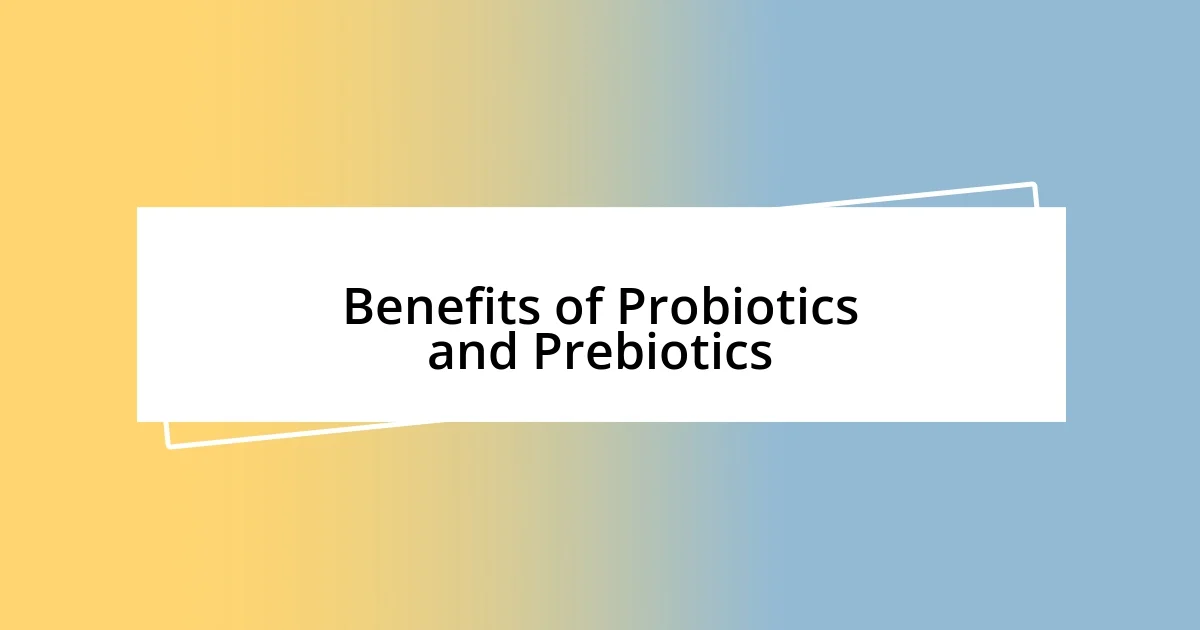Key takeaways:
- Gut health significantly influences overall well-being, impacting digestion, immune function, and mental health.
- Incorporating dietary changes like increased fiber, fermented foods, and hydration can greatly enhance gut health and energy levels.
- Tracking dietary habits and stress levels helps in understanding and improving gut health, fostering a positive relationship between mind and body.

Understanding Gut Health Basics
Gut health plays a crucial role in our overall well-being, often impacting everything from digestion to mood. I remember when I first learned about the gut-brain connection, and it really hit home. It’s fascinating how the bacteria in our guts can influence our emotions!
The microbiome, which consists of trillions of bacteria and microorganisms living in our digestive system, is like a bustling city. Have you ever felt sluggish after eating processed foods? That was my wake-up call to the fact that what I put into my body affects not just my energy levels but also the balance of my gut flora. It made me wonder how many others are unaware of this hidden connection.
Maintaining a diverse and healthy microbiome is essential for optimal health. I started incorporating more fermented foods into my diet—things like yogurt and kimchi—and noticed a real difference. Have you tried adding probiotics or prebiotics to your meals? It’s incredible how these small changes can lead to significant improvements in gut health and overall vitality.

Importance of Gut Health
Gut health is often underestimated, yet its importance cannot be overstated. I recall struggling with frequent bloating and discomfort until I understood that the state of my gut could affect my immune system. It’s remarkable how a healthy gut can lead not only to better digestion but also to a stronger defense against illnesses and infections.
Moreover, the mental health aspect is something I’ve come to value deeply. After adopting a gut-friendly diet, I noticed a positive shift in my mood and energy levels. It’s intriguing to think about how our gut bacteria can communicate with our brain, altering our feelings and behaviors. How many of you have considered that what’s happening in your belly could influence your well-being?
Engaging in practices that support gut health, like maintaining a balanced diet rich in fibers and probiotics, has been life-changing for me. I remember attending a workshop on nutrition where I learned about the importance of prebiotic foods, and I was inspired to try out different recipes. Since then, my perspective on food has transformed; I now see it as a way to nourish my microbiome and, in turn, support my body and mind.
| Benefits of Good Gut Health | Effects of Poor Gut Health |
|---|---|
| Improved Digestion | Bloating and Discomfort |
| Stronger Immune Function | Increased Illness |
| Better Mood Regulation | Anxiety and Depression |
| Enhanced Nutrient Absorption | Nutritional Deficiencies |

Dietary Changes for Gut Health
Dietary changes have been pivotal in my journey toward better gut health. I remember experimenting with different foods and how certain ones would make me feel light and energized, while others would leave me feeling sluggish. It became clear that my diet was inextricably linked to my gut’s performance.
Here are some dietary changes that can make a world of difference:
- Increase Fiber Intake: Incorporating more fruits, vegetables, and whole grains can boost the diversity of your microbiome.
- Fermented Foods: Adding foods like kombucha and kefir can introduce beneficial probiotics, enhancing gut flora.
- Limit Processed Foods: I noticed a significant reduction in bloating when I cut back on sugary snacks and fast food.
- Stay Hydrated: Drinking plenty of water has a profound impact on digestion and overall gut function.
- Healthy Fats: Including sources of omega-3s, like flaxseeds and walnuts, has been a game changer for my gut health.
One of the most significant changes I made was embracing prebiotic foods. I started using garlic and onions regularly in my meals, which not only added flavor but also nourished my gut bacteria. The first time I felt the difference—an increase in my energy levels and a decrease in discomfort—I was so excited it felt like uncovering a secret recipe for feeling great. It’s amazing how these small swaps can lead to big shifts in how I feel every day.

Incorporating Fermented Foods
Incorporating fermented foods into my diet was one of those game-changing moments I didn’t see coming. I remember my first sip of kombucha—how fizzy and vibrant it was! Initially, I wasn’t sure how it would affect me, but that tangy flavor soon became one of my favorites. Within a week, I noticed a remarkable difference in my digestion. It was as if my gut was cheering for a party.
Kefir was another delightful discovery. I used to think of it as just a trendy drink, but once I added it to my morning routine, everything shifted. I began to appreciate how this creamy, probiotic-rich beverage could work wonders not just for digestion but also for my overall mood. Have you ever tried a food that instantly made your day feel brighter? That’s what kefir did for me.
I also tried my hand at making sauerkraut at home, which turned out to be a surprisingly satisfying project. As I chopped the cabbage and mixed in my seasonings, I felt a sense of connection to ancient culinary traditions. It was this realization that these processes have been nourishing people for generations that resonated deeply with me. Plus, the thrill of tasting something I created added a personal touch to my gut health journey, reinforcing my belief that food is not just sustenance; it’s a source of joy and wellness.

Benefits of Probiotics and Prebiotics
Probiotics and prebiotics are powerhouses when it comes to gut health. I still remember the first time I learned about the difference between the two. Probiotics are those friendly bacteria found in foods like yogurt and sauerkraut, while prebiotics are essentially the fuel for those bacteria, found in foods such as bananas and asparagus. It’s like hosting a party where probiotics are the guests and prebiotics are the snacks keeping the energy high. I felt a sense of empowerment knowing that I could actively contribute to this balance in my gut.
One of the most incredible benefits I noticed after increasing my intake of these gut-friendly foods was improved digestion. There was a time when I’d experience discomfort after almost every meal. I’ll never forget that light feeling I experienced after incorporating more fermented foods into my diet. The bloating I once thought was normal simply faded away, and instead, I felt revitalized. Feeling at ease in my own body was a revelation; it made me wonder how many others might share this experience without realizing the solution lies within their diet.
Adding prebiotic-rich foods into my meals became a delightful challenge. I found myself experimenting with new recipes to include ingredients like garlic and leeks. It was like a cooking adventure. One evening, as I sautéed leeks with a splash of olive oil, the aroma consumed my kitchen—and I knew then that what I was doing was more than just nourishing my gut; it was a form of self-care. It highlighted for me that improving gut health isn’t just about the science; it’s about the joy of creating something that nurtures both body and spirit. Have you ever taken a moment to appreciate the simple joy of cooking for yourself? It can be surprisingly uplifting!

Lifestyle Changes for Gut Health
Making small lifestyle changes has also played a significant role in my journey toward better gut health. Taking time to breathe and relax might sound simple, but I discovered that stress was creating chaos in my digestive system. I remember a particularly hectic week at work when my stomach felt like a rollercoaster ride. Dedicating a few minutes each day to mindfulness meditation changed that. Now, I can consciously take a step back whenever I feel the tension rising and help my gut settle down.
Another effective change was incorporating regular physical activity into my routine. I’ll never forget the first time I took a long walk after a big meal. What at first seemed like a chore turned into a ritual that felt so refreshing. Movement not only helped with digestion but also shifted my mood almost instantly. Have you ever noticed how a quick stroll can clear your mind? It’s remarkable how something as simple as walking can aid digestion and boost gut health.
Lastly, I’ve paid more attention to my sleep patterns. I used to think late nights were just a part of life, but then I realized how they were impacting my gut. After committing to a consistent sleep schedule, I started waking up feeling lighter. Those groggy mornings were replaced with a sense of rejuvenation. It made me wonder how many others overlook the connection between gut health and sleep, and I strongly believe nurturing both areas can bring profound benefits.

Tracking Progress and Adjustments
Tracking my progress in improving gut health was an enlightening experience. I started a simple journal where I noted my meals, how I felt after eating, and any changes in digestion. I remember flipping through those pages and noticing patterns; it was intriguing to see how small tweaks in my diet could lead to significant shifts in well-being. Have you ever tried keeping a journal for your health? It’s like having a conversation with yourself that reveals so much!
As I tracked my journey, I realized that my body often spoke to me through its responses. There were days when I indulged in too many high-sugar treats, and my gut would protest with discomfort. That discomfort taught me to listen closely and adjust my choices. For example, when I replaced sugary snacks with higher-fiber options like chia pudding, the difference was night and day. It made me feel empowered to know I had the ability to steer my health in a more positive direction.
Adjustments aren’t just about diet; they also extend to daily habits. I began monitoring my stress levels, noticing that certain stressful situations exacerbated my digestive issues. Implementing quick stress-relief techniques, like deep breathing during busy moments, became crucial. I remember feeling a wave of calm wash over me after just a few breaths—it’s these small changes that add up. Do you recognize stress as a factor in your gut health? Making conscious adjustments allowed me to create a more harmonious relationship with both my mind and body.














